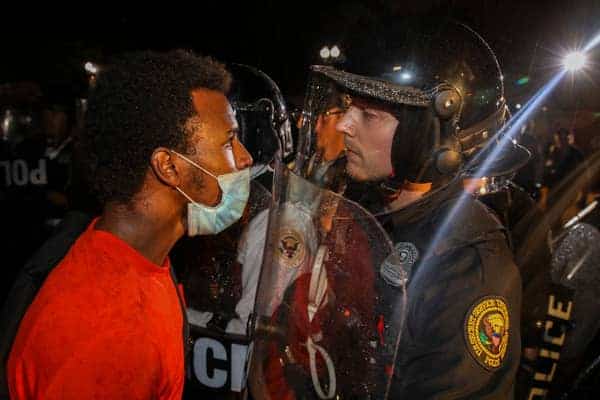
The Jews have been enslaved. They escape, leave their homes in Egypt, cross the Red Sea, and travel through the desert to Sinai for the giving of the Torah. But almost immediately a catastrophe occurs; a horrible act – the building of an idol – results in widespread death and destruction.
This Shavuot – a holiday to be celebrated in joy – seems to have mirrored those formative moments in the creation of the Jewish people. Enslaved this time by a virus, we had lost the many freedoms we had previously taken for granted. Finally, and with some trepidation, we were to be able to leave our homes with the hope of again leading free and normal lives, when a horrible act – this time a senseless killing – resulted once again in wholesale destruction.
At my synagogue – Westwood Kehilla – Shavuot was to mark the first cautious steps toward freedom. We followed all of the rules – an outdoor service, social distancing, reservations and masks required, no sermon and no singing so as to avoid unnecessary projecting of breath. In the outdoor area where we normally have Shabbat Kiddush, we put down masking tape to delineate where seats were permitted, with six feet of distance, front, back and sideways, for every chair. We used a portable mechitza to divide the space so that men and women could attend. Unlike that first Shavuot, we barred children from being present.
We followed all of the rules – an outdoor service, social distancing, reservations and masks required, no sermon and no singing so as to avoid unnecessary projecting of breath.
Fifteen or so people showed up for the Thursday evening Shavuot service. Westwood Kehilla is typically an engaging and friendly community that prides itself on its outreach and welcoming atmosphere, and being together was obviously a source of pleasure. Nevertheless, socializing was abbreviated. No shaking hands. No hugging. No extended conversations. Keep your mask on.
All Shavuot services on Friday morning and afternoon followed the same routine, as did the Friday evening and Saturday morning services. But there was one significant change to the normal Torah reading. Typically, that reading is divided into segments, with a different congregant being called to the Torah to say a blessing before and after each segment is read by the individual who is actually reading from the Torah. To avoid close contact, this was altered, and the person doing the reading from the Torah also did each of the blessings before and after he read each segment.
As Shabbat and Shavuot drew to a close on Saturday, and nightfall approached, our experiment in virus-accommodated davening seemed to be successful, when suddenly a new challenge appeared. Our rabbi, Avi Stewart, while walking back to the synagogue for the mincha and maariv services at around 7:00 pm, was told by a guard at a local store that a curfew was to start at 8:00 pm that very evening. The city was in turmoil; there was widespread destruction.
To comply with the curfew, the Saturday afternoon mincha service suddenly had to be rushed and shortened. The usual reading from the Torah was omitted, and the usual repetition of the Amidah, the central prayer of the service, was abbreviated. The evening Maariv service, which marks the end of Shabbat and the beginning of the week, was skipped altogether so people could get home before the 8:00 pm curfew and daven that service at home.
In retrospect, Rabbi Stewart noted that, notwithstanding the turmoil and improvisation, there was “excitement and happiness” at being able to be together but, he added, that it was markedly diminished not only by the continuing caution concerning the virus, but by additional awareness that social disturbance had been added to social distancing.
So much pain for a holiday of joy.
Gregory Smith is president of Westwood Kehilla and an appellate attorney practicing in Los Angeles.























 More news and opinions than at a Shabbat dinner, right in your inbox.
More news and opinions than at a Shabbat dinner, right in your inbox.